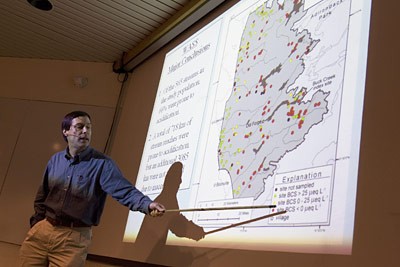Acid rain is not only changing soil chemistry, it is affecting climate change, says Geological Survey scientist
By Amelia Apfel
When we think of vital organs, we usually consider those in our bodies: our lungs, liver, heart or kidneys. Greg Lawrence, a scientist for the U.S. Geological Survey, however, made a strong argument for adding soil to that list, speaking on campus Jan. 25.
Soil is a nutrient source and filtration system for both terrestrial and aquatic ecosystems, he said, and human-triggered changes in the atmosphere that produce acid rain are severely altering the chemistry and functionality of soils all over the globe.
Acid rain is caused by air pollutants, mostly nitrogen oxides and sulfur dioxide, which are produced by power plants and gasoline-powered vehicles. Most rain is slightly acidic, but these pollutants can make rain much more acidic (to a pH of 4 -- neutral pH is 7).
Most soils can offset acidity in precipitation, Lawrence explained in his talk in Corson-Mudd Hall, because they can contain such elements as calcium and limestone, bases that neutralize the acid. But the levels of these bases in soil can vary widely, depending on the type of rock the soil comes from.
When the soil's buffering ability is nearly exceeded, the surplus acidification makes aluminum available in the soil, where it can be taken up by plants and washed into nearby streams, rivers and lakes.
"Aluminum is harmful to everything, from diatoms to spruce trees," said Lawrence, noting that research shows that acid rain actually reduces levels of calcium in the soil. Calcium is essential for many organisms, and loss of calcium in the soil may severely impact the health of an ecosystem, he said.
In the Adirondacks, for example, soil calcium levels have significantly declined since the 1930s.
Calcium depletion due to acid rain, however, is not a localized problem, Lawrence said. It also showcases the vital link between terrestrial and aquatic ecosystems, a link that is too often overlooked in studies of climate effects on different regions.
Climate change and acid rain are closely associated, Lawrence emphasized, so much so that acid rain's impacts need to be part of climate change studies.
"Acid rain really has left a legacy in terms of how it has changed our systems," Lawrence explained.
Amelia Apfel '08 is a writer intern at the Cornell Chronicle.
Media Contact
Get Cornell news delivered right to your inbox.
Subscribe